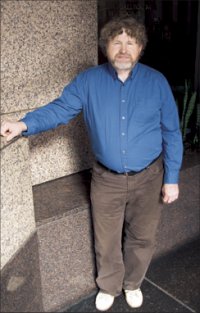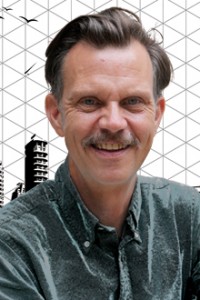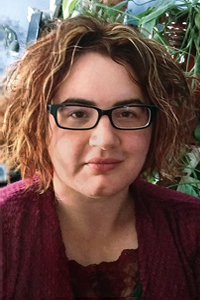Brian Evenson: Strange (But Never Gratuitous)
 Brian Evenson grew up in Utah, son of liberal Mormon parents. He attended Brigham Young University for his undergrad degree, and got his Master’s and PhD at the University of Washington at Seattle. Evenson did Mormon missionary work in France and Switzerland, but was eventually excommunicated, voluntarily, from the church partly due to conflict with the Mormon leadership over his writing. He has taught at Oklahoma State University, Syracuse University, the University of Denver, and Brown University.
Brian Evenson grew up in Utah, son of liberal Mormon parents. He attended Brigham Young University for his undergrad degree, and got his Master’s and PhD at the University of Washington at Seattle. Evenson did Mormon missionary work in France and Switzerland, but was eventually excommunicated, voluntarily, from the church partly due to conflict with the Mormon leadership over his writing. He has taught at Oklahoma State University, Syracuse University, the University of Denver, and Brown University.
Evenson began publishing stories with genre elements in the early ’90s, mostly in small-press magazines and literary journals. His story “Two Brothers” won an O. Henry Award in 1998. Other notable short works include novella Dark Property: An Affliction (2002) and International Horror Guild Award finalist “The Third Factor” (2005).
His first book was the collection Altmann’s Tongue (1994), and other collections include The Din of Celestial Birds (1997), chapbook Prophets and Brothers (1997), Contagion and Other Stories (2000), International Horror Guild Award winner the Wavering Knife (2005), and Fugue State (2009).
First novel Father of Lies (1998) is a dark thriller about corruption in a fictional church, and Edgar Award and International Horror Guild Award finalist The Open Curtain (2006) is a psychological thriller with connections to century-old crimes related to the Mormon Church. Last Days, an expansion of his 2003 Novella The Brotherhood of Mutilation, appeared in 2009.
Evenson now lives in Providence RI, where he is chair of the Literary Arts department at Brown University.
“I grew up in Utah. When people at school found out my parents were Democrats, they would say, ‘How is it possible for your parents to be Democrats and still be Mormons? You’re lying to me!’ From a very young age, I felt both within this religious culture and outside of it, and that the whole thing needed to be scrutinized and messed with.
“Both my mother and father read a lot, and they were capable of falling so deeply into books that you thought maybe they were dead. My love of books partly comes from (when I was four or five) trying to get them to do something for me, and they were so absorbed in their books I thought, ‘Well, these things must be amazing.’ ”
…
 “Altmann’s Tongue is a collection of stories which focus on violence in many ways. The characters have an absence of response to what’s going on around them — my idea was that the readers would have to fill in their own responses. The prose is fairly stripped-down, but I think it’s really about violence, America, and the relationship between the two. The people at BYU might have been OK with it if I’d come out and clearly said, ‘Violence is wrong,’ but I don’t think the purpose of my work is to impose a moral code on the reader. Although my work does try to put readers in a position where they have to think about moral issues and ethical choices.
“Altmann’s Tongue is a collection of stories which focus on violence in many ways. The characters have an absence of response to what’s going on around them — my idea was that the readers would have to fill in their own responses. The prose is fairly stripped-down, but I think it’s really about violence, America, and the relationship between the two. The people at BYU might have been OK with it if I’d come out and clearly said, ‘Violence is wrong,’ but I don’t think the purpose of my work is to impose a moral code on the reader. Although my work does try to put readers in a position where they have to think about moral issues and ethical choices.
…
“In a lot of people’s minds, there are these lines that separate the genres; I’m pretty dubious about that. For me, the line is the one between good work and bad work. Some of my colleagues, and a lot of writers in general, make clear distinctions between literary fiction and genre fiction. In a way I understand that, but when that becomes a means of limiting what people are going to read or controlling it in some way, it’s problematic and harmful. In my creative writing workshop we do a lot of reading as well, and I try to get students reading things they haven’t run across before: books in translation, books connected to detective fiction or horror or SF in some way, and some books that are more literary.”
…
 “Each book feels like a new thing to me, which is doubtless why I keep writing. The one that was the hardest to write was The Open Curtain, partly because I did a lot of things in that book that I hadn’t done before. The first section I wrote over the course of a year, the second section in about three weeks. Then I got to the third section and had an idea where it was going to go, wrote it, and it was completely wrong! It took me four or five years, and a lot of reading and thinking, to figure out how to start that last section, to come up the very simple act of calling three chapters in a row ‘Chapter One,’ but when I did suddenly it all came together.
“Each book feels like a new thing to me, which is doubtless why I keep writing. The one that was the hardest to write was The Open Curtain, partly because I did a lot of things in that book that I hadn’t done before. The first section I wrote over the course of a year, the second section in about three weeks. Then I got to the third section and had an idea where it was going to go, wrote it, and it was completely wrong! It took me four or five years, and a lot of reading and thinking, to figure out how to start that last section, to come up the very simple act of calling three chapters in a row ‘Chapter One,’ but when I did suddenly it all came together.
“I have been remarkably lucky, for someone who’s pushed in several directions at once. The kind of work I do feels to me very eccentric and personal; when I’m doing it right, I think you can read it and know it’s mine. Sometimes it’s hard to find editors who understand it, but as a result I’ve been left on my own to explore what I want to explore.”
…
“I’m between long projects right now, though I’m always writing stories. If I don’t get a good start on a long project in the summer, it’s hard to maintain it over the school year. I have a couple of ideas, like another weird noir I’m thinking of working on. (The definition of ‘weird’ has to be tweaked a little bit.)
“The books I’m trying to do now will continue to be different from what I’ve done before, but hopefully be satisfying to readers at the same time. I don’t think of myself as an experimental writer, just as a writer who’s willing to use any tool that I have to, to do the thing that’s necessary. Sometimes I do things that are very strange, but I hope they’re never gratuitous.”



 Website:
Website: Excerpts from the interview:
Excerpts from the interview:



The Mormon Expression Podcast needs to do an interview with this guy! Sounds like he has an interesting story with respect to the LDS Church.
Pingback:SF Tidbits for 5/31/10 | A Books Blog